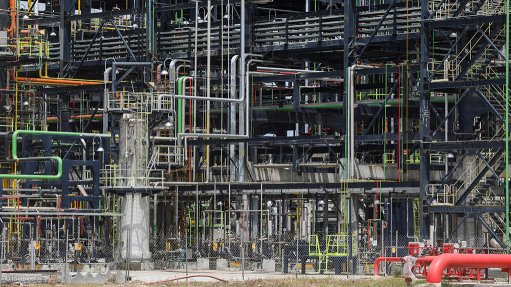Gas/nuclear could replace coal for SA’s electricity generation
This article has been supplied as a media statement and is not written by Creamer Media. It may be available only for a limited time on this website.
Gas or nuclear, or both, could eventually replace coal for South Africa’s electricity generation, says Dave Collins, associate director of MAC Consulting, one of South Africa’s leading management consulting groups focussed in mining; oil, gas and chemicals; financial services and telecommunications.
As a guest speaker at Gas Week 2014; Collins maintains that gas might, through emission reduction, be a stepping stone to the global low carbon economy while still providing the energy needed to support the world’s nine billion increasingly demanding people by 2050. “But,” he cautions, “this won’t be enough to fix the global warming problem, bearing in mind that the current trajectory for global warming is for around 4°C by 2100. And 4°C globally, means 6-7°C in Southern Africa.” He noted that the major published energy forecasts and scenarios were on average suggesting an average absolute increase in demand for fossil fuels of 35% by 2040.
Exacerbating the problem is that countries are largely focussing focus on providing energy security and energy supply right now, with inadequate responses on emissions reductions from energy consumption in the years or decades to come. He said, fossil fuels currently contribute 68% of anthropogenic emissions by way of coal (28%), oil (25%) and gas (15%), and 82% of global energy supply broken down into coal (29%), oil (32%) and gas (21%). While the use of fossil fuels is no more than a blip in the greater scheme of human history, the resultant emissions had been enough to exacerbate climate change. “Demand forecasts and scenarios from organisations like the World Energy Council and the International Energy Agency trigger cause for some alarm.
“There is general agreement internationally that a rise in the average global temperature rise from anthropogenic warming should not exceed 2°C above pre-industrial times if the risk of runaway climate change is to be avoided. So far, there has been little action to prevent this. “Governments are more concerned with energy security and providing energy access to their people, and assign environmental risks a lower priority. The fact is that after 250 years of fossil-fuel fired growth, we are finally bumping into planetary limits.” Collins contends that for many reasons, it will take decades to shift significantly away from fossil fuels. He says that the message of the Intergovernmental Panel on Climate Change has shifted significantly in the past seven years – from documenting dire impacts to finding solutions that integrate with broader societal challenges.
“Central to this new take is setting climate change in a context of other risks, uncertainties and mega-trends such as poverty and social inequality, urbanisation, and the globalisation of food systems.” The most recent (April 2014) IPCC assessment report, is unequivocal about the need to reduce emissions from fossil fuels, although it is positive about using gas in the medium term instead of coal. “The report maintains that GHG emissions from energy supply can be reduced significantly by replacing current world average coal-fired power plants with modern, highly efficient natural gas combined-cycle power plants or combined heat and power plants.”
As a long-term solution to the global energy problem Collins recommends a careful balance among what he terms the energy “trilemma”, comprising:
- Energy security, incorporating effective management of energy supply from domestic and external sources, reliability of energy infrastructure, and the ability of energy providers to meet current and future demand;
- Energy equity, incorporating accessibility and affordability of energy supply across the population; and
- Environmental sustainability, incorporating supply and demand side energy efficiencies and the development of energy supply from renewable and other low-carbon sources.
Comments
Press Office
Announcements
What's On
Subscribe to improve your user experience...
Option 1 (equivalent of R125 a month):
Receive a weekly copy of Creamer Media's Engineering News & Mining Weekly magazine
(print copy for those in South Africa and e-magazine for those outside of South Africa)
Receive daily email newsletters
Access to full search results
Access archive of magazine back copies
Access to Projects in Progress
Access to ONE Research Report of your choice in PDF format
Option 2 (equivalent of R375 a month):
All benefits from Option 1
PLUS
Access to Creamer Media's Research Channel Africa for ALL Research Reports, in PDF format, on various industrial and mining sectors
including Electricity; Water; Energy Transition; Hydrogen; Roads, Rail and Ports; Coal; Gold; Platinum; Battery Metals; etc.
Already a subscriber?
Forgotten your password?
Receive weekly copy of Creamer Media's Engineering News & Mining Weekly magazine (print copy for those in South Africa and e-magazine for those outside of South Africa)
➕
Recieve daily email newsletters
➕
Access to full search results
➕
Access archive of magazine back copies
➕
Access to Projects in Progress
➕
Access to ONE Research Report of your choice in PDF format
RESEARCH CHANNEL AFRICA
R4500 (equivalent of R375 a month)
SUBSCRIBEAll benefits from Option 1
➕
Access to Creamer Media's Research Channel Africa for ALL Research Reports on various industrial and mining sectors, in PDF format, including on:
Electricity
➕
Water
➕
Energy Transition
➕
Hydrogen
➕
Roads, Rail and Ports
➕
Coal
➕
Gold
➕
Platinum
➕
Battery Metals
➕
etc.
Receive all benefits from Option 1 or Option 2 delivered to numerous people at your company
➕
Multiple User names and Passwords for simultaneous log-ins
➕
Intranet integration access to all in your organisation

















